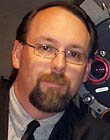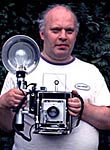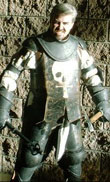|
|
This topic comprises 2 pages: 1 2
|
|
Author
|
Topic: Cell phone violence in a theatre
|
Dennis Benjamin
Phenomenal Film Handler

Posts: 1445
From: Denton, MD
Registered: Feb 2002
|
 posted 10-16-2003 06:53 PM
posted 10-16-2003 06:53 PM





How are the rest of you handling cell phones at your theatres?
Movie theater spat ends in violence
Man charged with stabbing in the foot
Thursday, October 16, 2003
--------------------------------------------------------------------------------
RANDOLPH, Mass. - A fight that started with violations of basic movie theater etiquette ended with one man allegedly being stabbed in the foot.
Jose Pujols, 27, of Boston's Dorchester neighborhood, has pleaded innocent to assault and battery with a dangerous weapon and possession of marijuana, the Norfolk District Attorney's office said.
The fight started Sunday evening at the Showcase Cinemas in Randolph, when Pujols ignored the request of a man sitting behind him to turn off his ringing cell phone, the Randolph police said.
The other man's daughter had her feet on Pujols's seat earlier that evening but had removed them at Pujols's request. After Pujols refused to turn off his cell phone, the girl's father, identified only as a 37-year-old Randolph resident, put his feet up on Pujols's seat, the police said.
That's when Pujols allegedly stabbed the side of the man's foot.
"It sounds like he stabbed him at an awkward angle, lessening the severity of the blow," Randolph police Lt. Richard Crowley said. The wound did not appear serious, Crowley said, and the victim told the police he would seek medical attention on his own.
The knife was found in Pujols's truck in the theater parking lot, apparently taken there by a friend, Crowley said. The police also found a small amount of marijuana in his truck.
He was released after his arraignment Tuesday and is due back in court on Nov. 10 for a pretrial hearing.
Thursday, October 16, 2003
THE LINK:
http://www.cmonitor.com/stories/news/newengla2003/101603mass_movie_2003.shtml
| IP: Logged
|
|
|
|
|
|
|
|
|
|
|
|
|
|
Frank Angel
Film God

Posts: 5305
From: Brooklyn NY USA
Registered: Dec 1999
|
 posted 10-21-2003 01:26 AM
posted 10-21-2003 01:26 AM





The FCC also has rules about jamming, but like most things the FCC rules on, they have very limited enforcement staff and they pick and choose their battles, usually based on a complaint. I doubt that installing a jammer would cause much of a problem. And if the public knows there is "poor" cell phone reception inside the theatre, what would be the reason for a complaint?
To circumvent even the hint of bending an FCC rule, I understand that there is a company which manufactures a material that can be mixed with cement and even mixed with paint that will effectively block cell signals. I don't think the FCC rules cover that situation because the signal is stopped by naturally occurring materials, it is not an "active" of jamming electronic device. Besides, what's the FCC gonna do, say cement and building wiring is illegal?
Besides, here in NYC we have a law that says cells and beepers have to be turned off in restaurants, theatres and maybe in even hospitals, I'm not sure.
Christopher, as for the irate doctor or other emergency type personnel complaining about not being able to get signals.... do they think they have a case against the mobile phone company when they are in an area where they can't get a signal? That happens all over the place. There are dozens of places in my own theatre basement floors where I can't get a cell signal. Too bad. I can't get signals in WalMarts....should they be forced to install repeaters in their store so me and my doctor friends can get cell calls? GIVE ME A BREAK.
I think the legal issue, if there even is one, would be to post a notice at the Box Office saying something like "Notice, Please turn off all cell phones and beepers beyond this point. Be aware, because of the construction of the building, cell phones will not function inside the theatre. If you must make an emergency call, go to the lobby. Doctors and Emergency Personnel may leave their name and the theatre number they are atteneding with management.
Will all due respect to the doctors in the house....they are rarely in the house. We have a sign up like that and we hardly ever get doctors announcing that they are in the theatre. They hardly ever do this because they are afraid that they might be called in case of a real emergency. Put up that sign and it will usually shut them up.
Frank
| IP: Logged
|
|
|
|
|
|
Michael Gonzalez
Jedi Master Film Handler

Posts: 790
From: Grand Island , NE USA
Registered: Sep 2000
|
 posted 10-21-2003 10:27 AM
posted 10-21-2003 10:27 AM




The Wave Shield http://starportuk.com/21.htm
The C-Guard LP http://www.netline.co.il/LP.htm
http://www.newhouse.com/archive/story1a092200.html
Cell Phone Jammers, Illegal in U.S., Can Create Silent Zones
By MARGIE WYLIE
c.2000 Newhouse News Service
The incessant ringing was bad enough, but when patrons of the Whiteley Shopping Centre's cinema in London began answering their cellular telephones mid-movie -- shouting to be heard above the dialogue -- Nasser Ahmadi knew something had to give.
"Some people were getting so angry that they were leaving the cinema," said Ahmadi, a consultant to Universal Cinemas International, which operates the multiscreen movie house. "People were asking why we didn't do something about it."
Across the globe, cell phones disturb plays, concerts and films. Phones ring out during funerals and weddings. They bleep and buzz in trains, restaurants and bathrooms. Cell-phone-free zones, polite requests, even icy glares can't seem to stop the ringing and consequent jabbering.
But Ahmadi found something that does: a cellular telephone jammer.
Five months ago, he installed the C-Guard cellular telephone firewall and complaints stopped. Made by an Israeli company called NetLine, the C-Guard is one of a handful of cell phone jammers commercially available today.
But don't go looking for one at your neighborhood electronics store.
"The technology is illegal in the U.S. and it's our position that it should be," said Travis Larson, spokesman for the Cellular Telephone Industry Association, based in Washington, D.C.
Within their operating radius, jammers prevent wireless phones from contacting a cellular radio tower. The affected phone behaves as it would any place where reception is too poor to carry a call.
Users "don't complain because they don't know what's going on," Ahmadi said. "There are lots of places where there are blackouts, anyway. They think it's the construction of the building, so they come out in the foyer to make their phone calls."
"It's very Machiavellian but perfectly harmless," said Jonathan Lemel, managing director for Special Electronic Security Products, U.K. Ltd. of Manchester, England, which manufactures jammers.
Not everyone agrees. The devices are banned in most industrialized countries, which don't take kindly to disruption of licensed radio services.
"Obviously, spectrum is licensed by the FCC (Federal Communications Commission) and purchased by broadcasters of all kind to transmit information," said Larson, the cellular industry spokesman. "And those pieces of spectrum become the property of those using them for the length of the licenses. So using a jammer is analogous to taking someone else's property."
Gil Israeli, NetLine's CEO, counters that if anything's being stolen, it's the peace and quiet of those of us forced to endure loud cell phone conversations.
Regulators have no beef with people installing expensive metal shielding around rooms to block cell phone usage, Israeli observed. "Our only argument with the FCC is whether people should be allowed to defend their space actively as well as passively, using an inexpensive device," he said.
Richard DiSabatini, director of Intelligence Support Group, Ltd., a jammer maker based in China Lake, Calif., agreed. "This is a whole gray area," he said. "If you were in my home and I didn't want you using your cell phone, why shouldn't I have the right to block you?"
DiSabatini's firm does not advertise its jammers. It sells them only for export, to the military, or to those law enforcement agencies exempted from FCC rules, he said.
At its simplest, jamming any radio device involves transmitting a signal on the same frequency and at high enough power that the two signals collide and cancel each other out. The effect is similar to what happens when you drop two pebbles in still water and rings of waves radiate out from them. Where the rings meet, the water becomes smooth.
Cellular telephones, however, are more challenging to jam than most radio transmissions. Different cellular systems operate over a wide range of frequencies. Within those frequencies, any single phone may "spectrum hop" to find a band free of interference. Plus, phones can notch up their power to try to overcome interference.
Cell phone jammers have to be sophisticated enough to squelch phone signals without interfering with other devices, from garage door openers to medical equipment. In addition, they must operate at power levels high enough to overcome cell phone signals, but not so high that the jamming effect leaks outside the intended coverage area.
In fact, leakage is a key reason the FCC and other regulators refuse to license jammers, Israeli said. But if governments set specific rules for exactly how much leakage could be tolerated, he said, NetLine could meet them.
"You don't expect someone in an apartment complex not to use his TV. We accept that some noise will come from our neighbors, but we have some idea of what is a reasonable standard," Israeli said.
To the cell phone industry, however, leakage isn't the only problem. Larson noted that more than 118,000 emergency calls are made each day from cell phones. And what if a doctor in a theater misses an emergency call because of a jammer?
Surreptitiously cutting off cellular telephone access is like snipping off the burning tip of a cigarette because you object to secondhand smoke, jammer foes say. "The answer is etiquette, education, making sure people are using their cell phones in ways that don't invade other people's space," Larson said.
Larson's association and many of its member companies, including cell phone manufacturer Nokia and service provider U.S. Cellular, are pouring money into public education campaigns to encourage cell phone users to be more considerate.
The FCC has fielded enough queries about the legality of cell phone jammers that it issued a notice last year. In it, the agency warns that jammers violate federal laws that broadly prohibit interfering with licensed radio spectrum. Owning, manufacturing, marketing, offering for sale or operating a cell phone jammer is punishable by an $11,000 fine and up to a year in prison for each offense, the notice states.
Stern warnings to the contrary, the agency has never seized a single jammer or prosecuted an operator to the best of his knowledge, said Richard Welch, associate chief of the FCC's Enforcement Bureau.
"We haven't taken any actions because nobody has complained," Welch said, adding that it was possible jammer users were simply flying under the FCC's radar.
Lemel agreed. When a cell phone doesn't work, he said, "the first thing you think isn't, `I'm being jammed."'
It's not because they're not in use, if sales are any indicator. Lemel says the United States is his firm's biggest market for cell phone blockers. And NetLine, Israeli says, also sells many devices in the States, though Europe is its largest market.
Both companies sell liberally in Latin America, the Middle East and Asia, where jammers are used for personal and corporate security. For example, many South American banks jam cell phones to prevent robbers from guiding outside accomplices to mug people who've just made large withdrawals, Israeli said.
Cell phone jammers are readily available on the Internet. Many can be battery-powered and fit in a pocket or briefcase for people who would like to enjoy a meal, movie or church service in peace.
A portable C-Guard sells for about $900 and can cover the area within a 450-foot radius. Lemel's company offers the $890 M2 Jammer, which comes in a briefcase and can block phones within a maximum radius of 50 feet. It's advertised as "ideal for the executive interested in keeping meetings and working lunches free from external distractions." Hubgiant of Taipei, Taiwan, sells its WAC1000 personal jammer, which has an operating radius of up to 30 feet, for $169. And Uptron of Lucknow, India, offers a full range of jammers with coverage ranging from 20 feet to over one mile.
Despite cellular industry fears, the majority of jammer sales aren't to revenge-seeking Luddites, Israeli said. Most go to business owners, government and police. Law enforcement officers can use jammers to throw a net of silence over hostage takers. Corporations use jammers to protect trade secrets. Ahmadi said three British hospitals evaluated the C-Guards in his theater before installing them to prevent interference with crucial medical equipment.
At least one company offers a technological alternative to jamming, and others are working on them.
Zetron Inc., based in Redmond, Wash., manufactures a system that can detect cell phones and warn users to turn them off. It can cover up to a 90-foot radius. BlueLinx Inc. of Charlotte, N.C., is working on Q-Zone, a system that will turn off cell phones or silence their ringers when they enter a protected space. It relies on shortwave technology called Bluetooth that hasn't been widely adopted by cell phone makers and may not be on the market for another three to four years. NetLine is developing a similar system that will work with existing European digital cellular telephones, but not American devices.
In some countries, jammers are gaining currency as a legitimate defense against cell phone abusers. In Japan, Tokyo-based Medic Inc. sold thousands of its Wave Wall jammers to restaurants, funeral directors and others before the government limited their sale. Now jammers must be licensed for use in Japan, and used only in spaces such as live-performance theaters where cell phones are judged by the government to be a nuisance.
But even that's a victory, says Israeli, who thinks such uses help governments see that cell phone "firewalls" can serve a legitimate market under controlled conditions.
"Legislators and government bodies have not yet realized that (jammers) can fulfill a useful role in society," Lemel said. "One of these days, they'll wake up to it."
| IP: Logged
|
|
Leo Enticknap
Film God

Posts: 7474
From: Loma Linda, CA
Registered: Jul 2000
|
 posted 10-21-2003 11:20 AM
posted 10-21-2003 11:20 AM





quote:
Surreptitiously cutting off cellular telephone access is like snipping off the burning tip of a cigarette because you object to secondhand smoke, jammer foes say.
Not a very good analogy - there is a body of sound scientific evidence to suggest that 'passive smoking' presents a real health risk in its own right, the implication of which is that forcibly extinguishing someone's fag (especially if s/he is smoking in a 'no smoking' area) is perfectly justified.
quote:
"The answer is etiquette, education, making sure people are using their cell phones in ways that don't invade other people's space," Larson said.
Sorry, it isn't. As noted earlier in the article, many people ignore 'no mobiles' areas in restaurants, cinemas and trains. They do so because they know these requests are not legally enforcable and that therefore they can be ignored without any fear of retribution. The only way you're going to get these people to behave is either to introduce meaningful sanctions and enforce them, or use a technical means of making the things impossible to use (analogous, for example, to a high pressure sprinkler being activated whenever someone lit a cigarette in a given space).
Take another example - drink driving. This has always been illegal, but until the late 1960s it was a law that was almost universally ignored. Then breathalysers came along, followed by a one-year mandatory ban for driving a car with over a given proportion of alcohol in your bloodstream. The reason that virtually no-one drinks and drives now is not because they've seen the light and accept the safety arguments, but because they know that there's a good chance of being caught and that if they are caught they'll face a substantial penalty.
Exactly the same applies to smoking and mobile 'phones. The signs in a 'no smoking' carriage say 'No smoking - Penalty £200'. By contrast, the 'no mobiles' snipes which are shown in cinemas say 'Please switch your mobile 'phone off out of respect for others', or words to that effect. That is why people obey the no smoking rule, but not the no mobiles one.
So I'm in favour of legalising jammers simply because it would save the trouble and expense of a whole lot of law enforcement. There would have to be a system for dealing with jammers that affected adjacent property or areas, but I'm sure that one could be devised. For example, if a neighbour plays their stereo at 100db plus in the middle of the night, then the council can investigate and then order them to turn it down under a by-law. I see no reason why this principle couldn't also apply to 'phone jammers. I would also have no problem with 'phones being designed to distinguish between a weak signal area and being jammed (if this is technically possible) and informing their user accordingly.
| IP: Logged
|
|
Stephen Furley
Film God

Posts: 3059
From: Coulsdon, Croydon, England
Registered: May 2002
|
 posted 10-21-2003 01:42 PM
posted 10-21-2003 01:42 PM




I think all mobile 'phone calls should cost a minimum of five pounds per minute; that way they could still be used in an emergency, but you wouldn't get people making two hour calls on them, as I have had to put up with several times recently. There was one on the train the whole way from York to London when I did the journey a few weeks ago.
Would somebody please explain to these people that they are, in fact, using a telephone, and they don't have to shout in order to be heard by the person at the other end of the line.
Then there is the conversation itself:
Hello...
Yeah, it's me...
Yeah me...
ME!!!...
'Ere, you 'eard about Sharon?
Yeah, Sharon...
Who'd 'av thought it...
Yeah, and Dave...
Wot, Dave?
Kate! You sure?
Wot! No, not 'er as well...
Where're we goin' then?...
Wot, the Rat strangler and Parrot?...
But that barmaid there, she's a right slag...
Wot about the tattooed sheep, the drinks are right cheap there.....
I have to sit through two hours of this.
Then there is a different style of conversation, which seems to be used almost entirely by black teenaged girls. No other race, age or gender of telephone owner seems to use this style of conversation, for some reason; though they do use others which are just as brain destroying. In this one, a previous conversation is being repeated to the person on the other end of the telephone. The original conversation having taken place between the person I can hear, and some unknown third party, and to make sure that the person to whom the conversation is being repeated (and everyone else within a ten metre radius) can understand who said what, each line is prefixed with:
So this is me, Yeah.
Or:
And this is 'er, right.
It goes something like this:
So this is me, Yeah. "You were down the club on Saturday"
And this is 'er, right. "No I weren't"
So this is me, Yeah. "You bleedin' were"
And this is 'er, right. "I never was"
Etc. etc. etc.
Sometimes you get several similar conversation going on simultaneously. I get this on the bus, going to work, most mornings.
It's enough to make you want to grab the 'phone, and throw the thing, and quite possibly its owner with it, out of the window.
| IP: Logged
|
|
|
|
|
|
|
|
All times are Central (GMT -6:00)
|
This topic comprises 2 pages: 1 2
|
Powered by Infopop Corporation
UBB.classicTM
6.3.1.2
The Film-Tech Forums are designed for various members related to the cinema industry to express their opinions, viewpoints and testimonials on various products, services and events based upon speculation, personal knowledge and factual information through use, therefore all views represented here allow no liability upon the publishers of this web site and the owners of said views assume no liability for any ill will resulting from these postings. The posts made here are for educational as well as entertainment purposes and as such anyone viewing this portion of the website must accept these views as statements of the author of that opinion
and agrees to release the authors from any and all liability.
|

 Home
Home
 Products
Products
 Store
Store
 Forum
Forum
 Warehouse
Warehouse
 Contact Us
Contact Us




 Printer-friendly view of this topic
Printer-friendly view of this topic







![[Wink]](wink.gif)

![[Big Grin]](biggrin.gif)

![[fu]](graemlins/fu.gif)




![[Eek!]](eek.gif)





